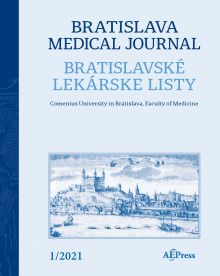Journal info
|
||||
Select Journal
Journals
Bratislava Medical Journal 2024 Ahead of print 2023 2022 2021 2020 2019 2018 2017 2016 2015 2014 2013 2012 Endocrine Regulations General Physiology and Biophysics Neoplasma Acta Virologica Studia Psychologica Cardiology Letters Psychológia a patopsych. dieťaťa Kovove Materialy-Metallic Materials Slovenská hudbaWebshop Cart
Your Cart is currently empty.
Info: Your browser does not accept cookies. To put products into your cart and purchase them you need to enable cookies.
Bratislava Medical Journal Vol.123, No.10, p.724–729, 2022 |
||
| Title: Susceptibility of Staphylococcus aureus strains to commercial therapeutic phage preparations | ||
| Author: Marek STRAKA, Zuzana HUBENAKOVA, Aneta LICHVARIKOVA, Lucia JANOSIKOVA, Barbora MARKUSKOVA, Andrej MINICH, Adriana LIPTAKOVA, Hana DRAHOVSKA, Livia SLOBODNIKOVA | ||
| Abstract: OBJECTIVES: The aim of this study was to determine the susceptibility of Staphylococcus aureus strains to commercial phage preparations. The strains were isolated from clinical patients as well as from nasal mucosa of healthy carriers. BACKGROUND: The elevating number of antibiotic-resistant S. aureus strains present a therapeutic challenge, especially in high-risk patients. One of the promising ways to solve this problem is phage therapy. METHODS: Susceptibility of 111 carrier strains of S. aureus (4 strains were methicillin-resistant; MRSA) and 81 clinical isolates from bloodstream or skin and soft tissue infections (28 were MRSA) to four commercial phage preparations was assessed in vitro by spot assay. The clonality of S. aureus strains was determined by spa typing. RESULTS: Spa typing revealed 97 distinct spa types. A proportion of 73–80 % of the tested S. aureus strains were revealed to have in vitro phage susceptibility, depending on the clonal affiliation of the strains and phage preparation tested. The susceptibility to phage preparations was significantly higher in MRSA strains (p < 0.001). CONCLUSIONS: In vitro results indicate a promising therapeutic potential of the tested commercial anti-staphylococcal phage preparations. They could be applied to a broad spectrum of bacterial clones, and have an excellent activity especially against MRSA strains (Tab. 2, Fig. 2, Ref. 43). |
||
| Keywords: Staphylococcus aureus, MRSA, therapeutic phages, S. aureus nasal carriage, skin and soft tissue infections, staphylococcal bacteriemia | ||
| Published online: 23-Jul-2022 | ||
| Year: 2022, Volume: 123, Issue: 10 | Page From: 724, Page To: 729 | |
| doi:10.4149/BLL_2022_116 |
||
|
|
 download file download file |
|

